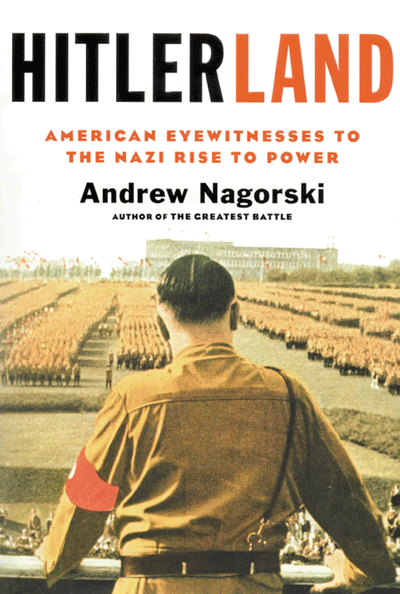Reviewed by NEAL GENDLER
What did Americans know about Hitler, Nazis and abuse of Jews before the war?
If they read certain newspapers or heard Edward R. Morrow’s roundup of CBS European correspondents, they could have known a lot. But Andrew Nagorski’s Hitlerland makes it clear that the 50 or so American correspondents stationed in Berlin between the wars were less candid in their news reports than in their diaries and letters.
They had the usual journalistic hobbles: trying for objectivity and balance, and keeping access to news sources, which can mean walking an invisible line of not antagonizing them so that they cut you off.
They also faced two more rare realities: Much of the American public and government disbelieved the awfulness being reported, and being too critical could bring expulsion — or worse.
The Chicago Daily News’ Edgar Mowrer, whose reporting from Europe won a 1933 Pulitzer Prize, put his observations in a book, Germany Puts the Clock Back. Brownshirts began following him. His boss ordered him out, but before Germans knew, Mowrer negotiated his resignation as head of the Foreign Press Association in return for the release of 86-year-old Paul Goldmann, an ailing Berlin correspondent of a Vienna newspaper.
When Germany told the U.S. State Department that because of “the people’s righteous indignation,” Germany could no longer guarantee Mowrer’s safety, he took the advice he’d given Jews: “Get out, and fast.”
Not only Jews were threatened. In the early Nazi days, mobs of roaming Brownshirts savagely beat anyone failing to give the Nazi salute.

Nagorski tracks the reporting and candid views of journalists, diplomats, wives and others from 1919 to Hitler’s declaration of war on America on Dec. 11, 1941, when only 15 U.S. correspondents remained.
Best remembered is CBS correspondent William L. Shirer, who detested the Nazis. His monumental 1960 book, The Rise and Fall of the Third Reich, which won a National Book Award, recently was reissued.
Hitlerland cannot help being compared with Erik Larson’s 2011 In the Garden of Beasts. Both show the growing evil through American eyes. Larson focuses on U.S. Ambassador William Dodd and the eyebrow-raising romantic escapades of his daughter. Nagorski paints a broader picture from news reports, official cables, unpublished manuscripts, interviews and letters.
Both books cover some of the same ground and are very readable, even enjoyable trips through a sort of time machine because the participants did not know the outcome.
In the early 1920s, Hitler could seem somewhat ridiculous. H.R. Knickerbocker saw Hitler at a 1923 Munich rally and “broke out laughing,” saying “he looks like a caricature of himself.” Dorothy Thompson, Knickerbocker’s predecessor for the Philadelphia Public Ledger and the New York Evening Post — and soon to be Mrs. Sinclair Lewis — found Hitler to be of “startling insignificance” in 1931. But her change of mind led to the 1934 honor of being the first American correspondent expelled.
As early as 1922, Hearst’s Karl von Wiegand, the first American correspondent to interview Hitler, called him “a magnetic speaker having also exceptional organizing genius.” Capt. Truman Smith, U.S. assistant military attaché and the first U.S. official to interview Hitler, called him “a marvelous demagogue. I have rarely listened to such a logical and fanatical man. His power over the mob must be immense.”
As Hitler consolidated power, increased repression and intensified persecution of Jews, any remaining scales fell from most correspondents’ eyes.
Nagorski has done a good job of compiling, organizing and writing, although I’d have liked more from correspondents’ news reports and a list of their names and employers.
He tells three things not well known. First, Kristallnacht violence lasted two days. Second, propagandist Putzi Hanfstaengl, a Harvard grad, claimed to have given Hitler the idea of rousing rally music and cheerleaders — “rah, rah, rah” transforming into “Sieg Heil!” And third, Nagorski says Hanfstaengl’s American-born wife harbored a dejected Hitler after his failed 1923 Munch “beer hall putsch” and, fearing his suicide, took a revolver from his hand.
If so, too bad.
***
Neal Gendler is a Minneapolis writer and editor.
(American Jewish World, 7.20.12)



















